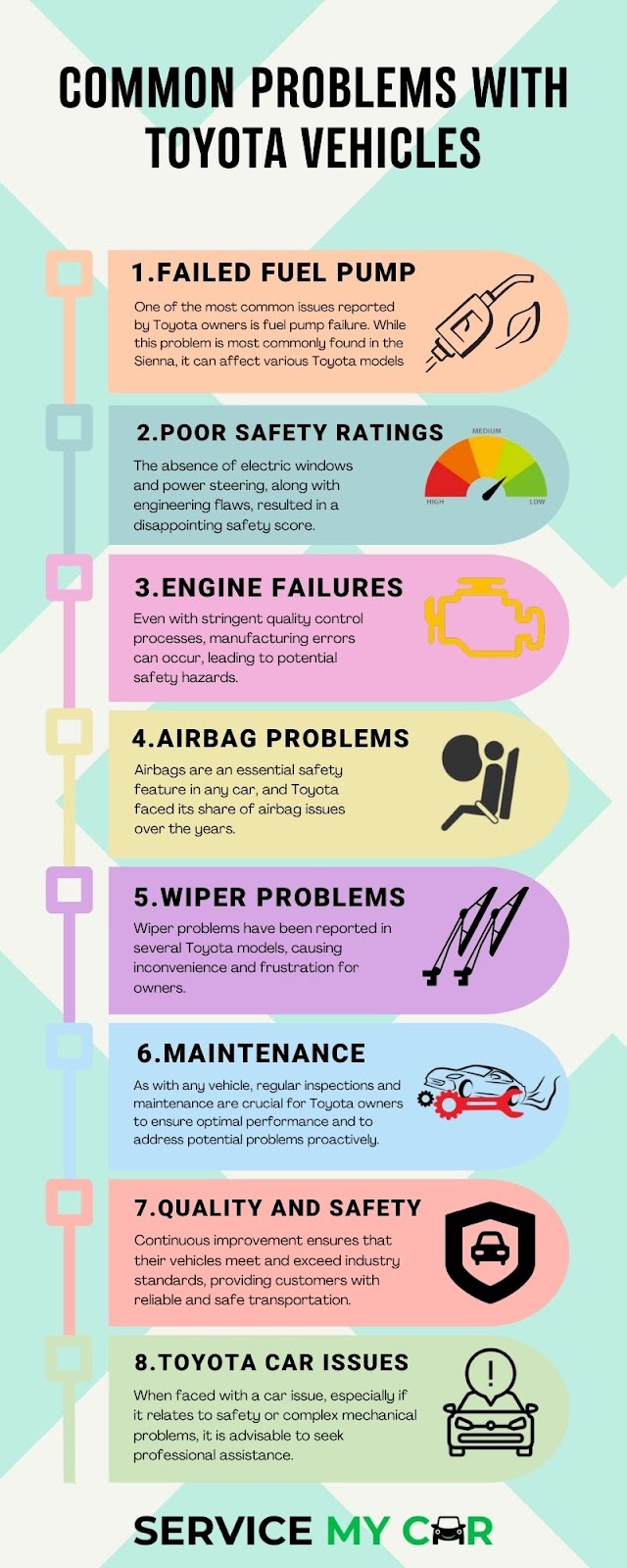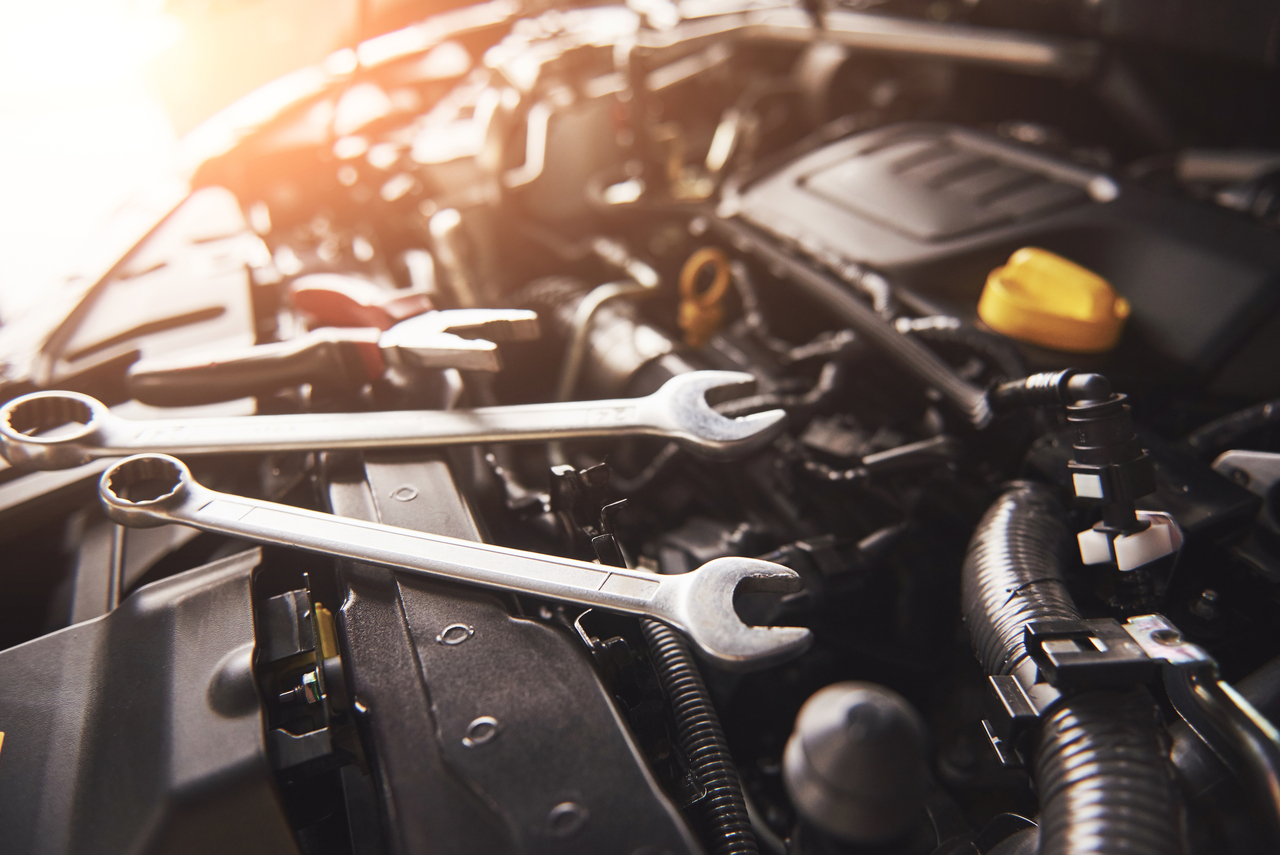Toyota, the renowned Japanese car manufacturer, has established itself as one of the most popular car brands worldwide. With a rich history dating back to the 1930s, Toyota has introduced a wide range of models and designs that have stood the test of time.

However, like any other car brand, Toyota vehicles are not immune to issues. In this comprehensive guide, we will explore some of the most common problems reported by Toyota owners, ranging from fuel pump failures to wiper issues. So, if you own a Toyota or are considering buying one, read on to stay informed about potential problems and their solutions.
1. Failed Fuel Pump

The Danger of Stalled Engines
One of the most common issues reported by Toyota owners is fuel pump failure. While this problem is most commonly found in the Sienna, it can affect various Toyota models. When a fuel pump fails, the engine can stall, leading to potential accidents and dangerous situations on the road. Recognizing the severity of this issue, Toyota took swift action by issuing a major recall to replace and fix the faulty fuel pumps. Over 1.8 million cars were affected by this recall, highlighting the manufacturer's commitment to customer safety.
Toyota's Recall Initiative
Toyota's proactive approach to addressing fuel pump failures demonstrates their dedication to quality and safety. By initiating a recall, Toyota ensures that affected vehicles undergo necessary repairs to rectify the fuel pump issue. This recall not only emphasizes the importance of regular maintenance but also showcases Toyota's commitment to resolving problems promptly and efficiently.
2. Poor Safety Ratings

The Case of the First Toyota Yaris
Safety is a crucial aspect of any vehicle, and Toyota is generally known for prioritizing it. However, the first-generation Toyota Yaris, introduced in 1999, received surprisingly low safety ratings. Designed as an entry-level vehicle for budget-conscious consumers, the initial Yaris committed to certain safety features to keep costs down. The absence of electric windows and power steering, along with engineering flaws, resulted in a disappointing safety score. Toyota later learned from this experience and made significant improvements in subsequent Yaris models.
Balancing Affordability and Safety
While the initial Yaris faced safety concerns, it is essential to recognize that Toyota has consistently aimed to strike a balance between affordability and safety in their vehicles. As technology advances and safety regulations evolve, Toyota continues to enhance the safety features of their cars. Today, Toyota models boast advanced safety systems, such as collision avoidance technology, lane departure warnings, and adaptive cruise control, ensuring a safer driving experience for their customers.
3.Engine Failures

Manufacturing Errors and Engine Cracks
Even with stringent quality control processes, manufacturing errors can occur, leading to potential safety hazards. Toyota experienced one such issue with engine failures caused by cracks in the engine. These cracks could result in coolant or oil leaks, leading to engine stalling, overheating, and, in extreme cases, even fire. Although not a widespread problem, certain models, including the 2020 Camry, Camry Hybrid, Avalon Hybrid, RAV4, RAV4 Hybrid, and Lexus, were subject to this issue. Toyota promptly addressed the problem by issuing engine repairs for affected vehicles.
The Models Affected
It is crucial for Toyota owners to be aware of the models that were affected by engine failures. If you own a 2020 Camry, Camry Hybrid, Avalon Hybrid, RAV4, RAV4 Hybrid, or Lexus, it is advisable to keep an eye out for any signs of coolant or oil leaks. Regular maintenance and prompt repairs can help mitigate the risk of engine failure and ensure the longevity of your Toyota vehicle.
4.Airbag Problems

Airbags and Safety Concerns
Airbags are an essential safety feature in any car, and Toyota faced its share of airbag issues over the years. In 2007, a majority of Corolla models were recalled due to concerns regarding the airbags. Some of these airbags were prone to rupture during deployment, posing a significant risk to drivers and passengers. Additionally, the Toyota Hilux also experienced airbag problems, leading to a recall in 2014 due to a minor wiring defect that could deactivate the airbags without warning.
Recalls and Risk Mitigation
To address airbag concerns, Toyota took immediate action by issuing recalls and providing solutions to rectify the problems. These recalls ensured that affected vehicles received necessary repairs to mitigate the risk associated with faulty airbags. Toyota's commitment to customer safety is evident in their proactive approach to addressing potential issues promptly and effectively.
5. Wiper Problems

Wiper Issues in Toyota Vehicles
Wiper problems have been reported in several Toyota models, causing inconvenience and frustration for owners. Specifically, the 2010 Toyota RAV4 and RAV4 EV were known to have wiper issues. Initially, the wipers functioned properly, but over time, erosion and rusting within the motor joint link caused the arm and link to separate. As a result, the wipers failed to operate efficiently when needed. While new wipers could resolve the issue temporarily, the problem often recurred, posing a persistent challenge for long-term Toyota owners.
Notable Models Affected
If you own a 2010 Toyota RAV4 or RAV4 EV, it is essential to be vigilant about potential wiper problems. Regularly inspecting the wiper mechanism and promptly replacing worn-out parts can help prevent further issues. Additionally, consulting a professional technician or reaching out to Toyota's customer support can provide guidance on resolving wiper-related concerns effectively.
6. Preventive Maintenance for Toyota Owners

Regular Inspections and Maintenance
As with any vehicle, regular inspections and maintenance are crucial for Toyota owners to ensure optimal performance and to address potential problems proactively. By adhering to the recommended maintenance schedule provided by Toyota, owners can detect and resolve issues before they escalate. Routine inspections of key components such as the engine, fuel system, brakes, and electrical systems can prevent major problems and extend the lifespan of the vehicle.
Importance of Timely Repairs
In addition to regular maintenance, addressing repairs promptly is essential for Toyota owners. Ignoring minor issues can lead to more significant problems down the line, potentially compromising safety and costing more in the long run. Whether it's a strange noise, warning light, or any other anomaly, seeking professional assistance and getting the problem diagnosed and resolved promptly is crucial to ensuring the reliability and longevity of your Toyota vehicle.
7. Toyota's Commitment to Quality and Safety

Continuous Improvement Initiatives
Toyota has long been recognized for its commitment to quality and safety. The brand continuously strives to enhance their vehicles and manufacturing processes, incorporating advanced technologies and implementing rigorous quality control measures. Toyota's dedication to continuous improvement ensures that their vehicles meet and exceed industry standards, providing customers with reliable and safe transportation.
Customer Support and Assistance
To support their customers, Toyota offers comprehensive customer support and assistance. If you encounter any issues with your Toyota vehicle, whether it's related to safety concerns or general maintenance, reaching out to Toyota's customer support team can provide valuable guidance and solutions. With their expertise and commitment to customer satisfaction, Toyota aims to address customer concerns promptly and effectively.
8. Tips for Resolving Toyota Car Issues

Seeking Professional Assistance
When faced with a car issue, especially if it relates to safety or complex mechanical problems, it is advisable to seek professional assistance. Certified technicians with expertise in Toyota vehicles can diagnose and repair problems accurately. Authorized Toyota service centers have access to the latest technical information, genuine parts, and specialized tools, ensuring that your vehicle receives the best possible care.
Communicating with Toyota
If you have experienced recurring issues or have concerns about your Toyota vehicle, open communication with Toyota can be beneficial. Reach out to Toyota's customer support team and provide them with detailed information about the problem you have been facing. Toyota values customer feedback and strives to address concerns effectively, offering appropriate solutions and working towards continuous improvement.
9. Frequently Asked Questions (FAQs)
Addressing Common Concerns
1. Q: Are Toyota vehicles generally reliable? A: Yes, Toyota vehicles are known for their reliability and longevity. However, it is essential to address any reported issues promptly to ensure optimal performance.
2. Q: Can I resolve minor issues in my Toyota vehicle by myself? A: While some minor issues can be resolved by owners, it is recommended to consult a professional technician to ensure accurate diagnosis and proper repairs.
3. Q: How often should I have my Toyota vehicle inspected? A: Following Toyota's recommended maintenance schedule is crucial. Regular inspections, generally conducted every 6-12 months, can help detect and address potential problems.
Expert Advice and Solutions
If you have further questions or concerns regarding your Toyota vehicle, consult an authorized Toyota service center or reach out to Toyota's customer support team. Their expertise and commitment to customer satisfaction ensure that you receive the necessary guidance and solutions to address your specific needs.
10. Conclusion
In conclusion, while Toyota vehicles have gained popularity worldwide, they are not exempt from experiencing issues. Recognizing and addressing these problems promptly is vital to ensure the safety, reliability, and longevity of your Toyota vehicle. By staying informed about common problems such as fuel pump failures, poor safety ratings, engine failures, airbag issues, and wiper problems, you can take proactive measures to mitigate risks and seek appropriate solutions. Remember to prioritize regular maintenance, seek professional assistance when needed, and communicate with Toyota to address any concerns effectively. With Toyota's commitment to quality and safety, you can enjoy peace of mind while driving your Toyota vehicle.
We offer everything you need and much more, with a simple digital solution. Our all-in-one platform covers all your car detailing servicing and car detailing bolton needs, regardless of what car maintenance service you require. 
